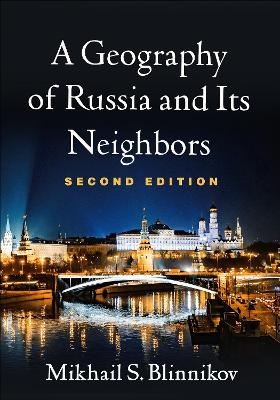
A Geography of Russia and Its Neighbors, Second Edition
Guilford Press (Verlag)
978-1-4625-4459-2 (ISBN)
Authoritative yet accessible, the definitive undergraduate text on Russian geography and culture has now been thoroughly revised with current data and timely topics, such as the annexation of Crimea and Sevastopol and other background for understanding Russia's 2022 invasion of Ukraine. Thematic chapters provide up-to-date coverage of Russia's physical, political, cultural, and economic geography. Regional chapters focus on the country's major regions and the other 14 former Soviet republics. Written in a lucid, conversational style by a Russian-born international expert, the concise chapters interweave vivid descriptions of urban and rural landscapes, examinations of Soviet and post-Soviet life, deep knowledge of environmental and conservation issues, geopolitical insights, engaging anecdotes, and rigorous empirical data. Over 200 original maps, photographs, and other figures are also available as PowerPoint slides at the companion website, many in color.
New to This Edition
*Separate chapter on Ukraine and Crimea, covering events through 2019.
*Timely topics--the political crisis in Ukraine and annexation of Crimea and Sevastopol; the return of Putin as president; climate change and environmental degradation; economic slowdown; political shifts in the republics; the role of Russian-backed forces in Syria, Libya, and Central African Republic; changes in Russia–United States relations; and more.
*Thoroughly updated population, economic, and political data.
*80 new or updated figures, tables, and maps.
Pedagogical Features
*End-of-chapter review questions, suggested assignments, and in-class exercises.
*Within-chapter vignettes about Russian places, culture, and history.
*End-of-chapter internet resources and suggestions for further reading.
*Companion website with all figures and maps from the book, many in full color.
Mikhail S. Blinnikov, PhD, is Professor of Geography and Graduate Coordinator at St. Cloud State University in Minnesota and Associate Researcher at Kazan Federal University Laboratory of Interdisciplinary Archaeological and Ethnological Studies in Kazan, Russia. A native of Moscow, Russia, he has traveled extensively in the former Soviet Union, including doing field work on the White, Baltic, and Black Seas; in Central Russia; on the Volga; and in Crimea, the Caucasus, and the Altay. Besides his work in Russia, he has visited Ukraine, Belarus, Latvia, Lithuania, Georgia, Kazakhstan, and Kyrgyzstan on extended field trips. Dr. Blinnikov’s research focuses on the late-Pleistocene biogeography of grasslands; phytolith analysis; remote sensing and geographic information systems; protected natural areas and green spaces in and near cities; young naturalist movements; and Orthodox religious landscapes. He has worked with the Biodiversity Conservation Center, the Center for Russian Nature Conservation, Nearby Nature, The Nature Conservancy, and the World Wildlife Fund Russia, among others. Dr. Blinnikov has also worked as an interpreter and translator for Russian–American exchanges and has written two books in Russian. He is a past president of the International Phytolith Society and president of the Eurasian Specialty Group of the American Association of Geographers.
1. Introduction: Russia and Post-Soviet Northern Eurasia
I. Physical Geography
2. Relief and Hydrography
3. Climate
4. Biomes
5. Environmental Degradation and Conservation
II. History and Politics
6. Formation of the Russian State
7. The Soviet Legacy
8. Post-Soviet Reforms
9. The Geopolitical Position of Russia in the World
III. Cultural and Social Geography
10. Demographics and Population Distribution
11. Cities and Villages
12. Social Issues: Health, Wealth, Poverty, and Crime
13. Cultures and Languages
14. Religion, Diet, and Dress
15. Education, Arts, Sciences, and Sports
16. Tourism
IV. Economics
17. Oil, Gas, and Other Energy Resources
18. Heavy Industry and the Military Complex
19. Light Industry and Consumer Goods
20. Fruits of the Earth: Agriculture, Hunting, Fishing, and Forestry
21. Infrastructure and Services
V. Regional Geography of Russia and Other FSU States
22. Central Russia: The Heart of the Country
23. Russia's Northwest: Fishing, Timber, and Culture
24. The Volga: Cars, Food, and Energy
25. The Caucasus: Cultural Diversity and Political Instability
26. The Urals: Metallurgy, Machinery, and Fossil Fuels
27. Siberia: Great Land
28. The Far East: The Russian Pacific
29. The Baltics: Europeysky, Not Sovetsky
30. Belarus and Moldova: Eastern Europeans
31. Ukraine and Crimea: Together or Not?
32. Kazakhstan and Central Asia: The Heart of Eurasia
33. Epilogue: Engaging with Post-Soviet Northern Eurasia
| Erscheinungsdatum | 19.03.2021 |
|---|---|
| Reihe/Serie | Texts in Regional Geography |
| Verlagsort | New York |
| Sprache | englisch |
| Maße | 178 x 254 mm |
| Gewicht | 894 g |
| Themenwelt | Geisteswissenschaften ► Geschichte |
| Geisteswissenschaften ► Psychologie | |
| Naturwissenschaften ► Geowissenschaften ► Geografie / Kartografie | |
| ISBN-10 | 1-4625-4459-2 / 1462544592 |
| ISBN-13 | 978-1-4625-4459-2 / 9781462544592 |
| Zustand | Neuware |
| Informationen gemäß Produktsicherheitsverordnung (GPSR) | |
| Haben Sie eine Frage zum Produkt? |
aus dem Bereich


